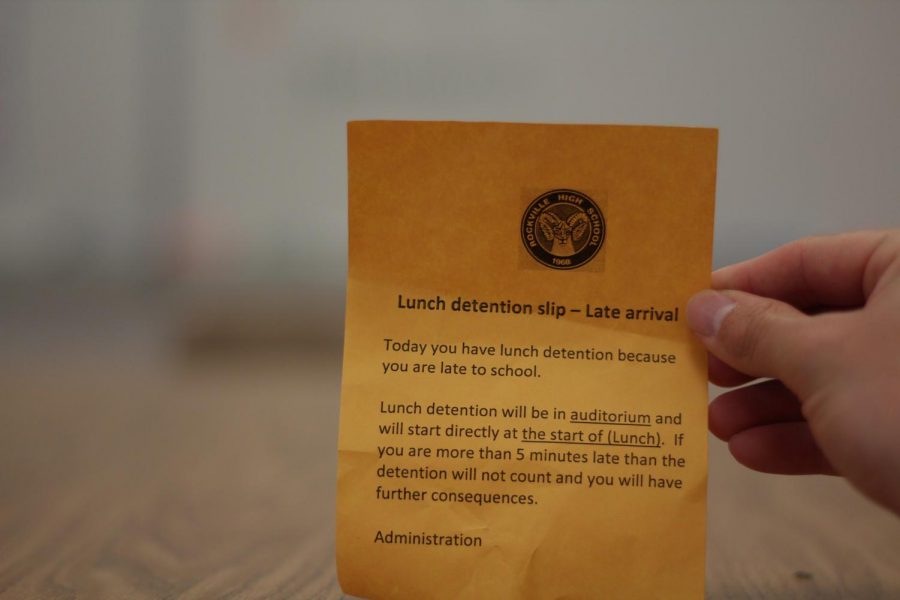125 Students Serve Lunch Detention on First Day of New Tardy Policy
New policy implemented April 3 gives all students with unexcused tardies a lunch detention.
April 4, 2019
Senior Emely Reyes rushed through the halls attempting to make it to first period before 7:45 a.m. after forgetting her art assignment in her car. Frantically, with her painting in hand, she weaved through students trying to make it to her art class. After unsuccessfully beating the bell, Reyes, still making an effort to get to class, was stopped by an administrator and given lunch detention.
Reyes was not alone, attendance secretary Mary Norfolk said; around 125 students received lunch detention after arriving to school late with no excuse following a policy change effective that same morning.
“I think it’s important to get there before the bell but if they [administrators] clearly see students are making an effort to get to class, pulling them aside giving them detentions just makes it worse for teachers because it makes kids even later,” Reyes said.
The new policy was implemented April 3 and is specific to RHS. With the updated guidelines, if students arrive between 7:45 and 7:55 with no pass, they are first instructed to sign a piece of paper indicating they are late and are then given a pass for lunch detention scheduled the same day in the auditorium.
“[Administration is] most concerned about the number that has increased in the last few weeks […] the numbers of students that are coming in between 7:45 and 7:55 […] has gotten into the hundreds on some days,” principal Billie Jean Bensen said.
In an attempt to support teachers who have been asking for administrative help to combat the unexcused tardy issue in their classes, the policy seeks to create a more severe consequence for students repeatedly interrupting a teacher’s class.
“I think [the policy] number one will encourage students to get to class on time because when they come in late it does interrupt the flow of the class for the teacher,” psychology teacher Christine Zafonte said. “I think it will teach some responsibility about why it’s important to get to class on time because when you get into the real world you can’t show up late for work.”
Despite a large number of students impacted, this new punishment for being late with no excuse was not publicized to all students. There was no announcement and although teachers were informed of the policy at a staff meeting April 1, they were not explicitly instructed to share the information with their students.
“This is not a threat to the whole school. We just want the kids that have been consistently coming late to get here on time,” Bensen said. “The vast majority of our students are here on time every day so it doesn’t really apply to them and the students that it has been applying to, we’ve been very vocal about it for about a week.”
While many acknowledge that attendance is an issue, the policy has been criticized as too harsh with no warning,
“Everyone has those days where we’re late and forget things and some students make the effort to try to get to class on time while others don’t, so I think they just have to weed them out. Also we weren’t warned about this new rule so it was uncalled for,” Reyes said.
The new procedure was not purposely started on a half day, security guard Will Morris said, and administrative discretion was used if students had prior commitments at lunch such as a test or a teacher meeting. While some students did not have to sacrifice their lunch on the half day, they are still being held accountable for their tardy and will serve lunch detention at a later date.
“I got to school at 7:44 but when I got to the back door it had already been locked and I had to walk all the way around the building which made me more late to class that was only a minute away from the back. I would come to find out I was getting a lunch detention which upset me due to the fact I had to retake a quiz,” senior Matt McTighe said. “ The security and administration [were] flexible and told me I could do the detention the next day which made me feel better.”





